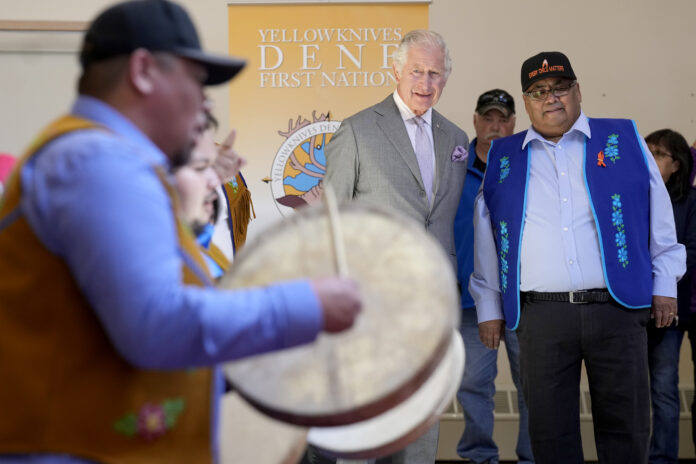The Queen’s Platinum Jubilee is a reminder of the complex relationships Indigenous people in Canada have with the Crown, as well as the work still left to do toward reconciliation, leaders say.
She is the first British monarch to celebrate a Platinum Jubilee marking 70 years on the throne, but the occasion has sparked renewed questions about the role the monarchy played in colonization, and whether the Royal Family should offer an apology.
Perry Bellegarde, former national chief of the Assembly of First Nations, spoke with Global News ahead of the celebrations.
“I think that’s a waste of energy and time,” he said when asked whether he thinks the Queen should apologize. “I would rather see and focus on what the monarchy is doing in terms of messaging,” Bellegarde said.
Prince Charles and Camilla, Duchess of Cornwall, faced calls to apologize to Indigenous people on behalf of the Crown during their visit to Canada last month.
Leaders from the Assembly of First Nations and the Metis National Council asked for an apology from the Queen, who is head of the Church of England.
The Church is among those that ran residential schools in Canada and has faced criticism for not doing enough to release records about the treatment and abuse of children forced to attend.
When it comes to that messaging, Bellegarde was clear: he sees Prince Charles’s strong focus on the need for sustainability and environmental protection as a valuable voice for a common interest.
“He’s a strong leader and an advocate for something very dear to all of us, not only in Canada but throughout the world. And that’s the climate, that’s the land, that’s the water, that he’s always espoused the need to put nature first,” Bellegarde said.
Trending Stories
With Harry and Meghan at Platinum Jubilee, is the Queen tying up ‘loose ends?’
What Doug Ford can teach the federal Conservative party
“I quipped with him one time when we met with him in England that he was a First Nations person in another life, because he espouses our worldview as First Nations people: how we’re all connected to the land, are all connected to the water. And he always talks about sustainable development.”
“That’s really the key for all of us globally.”
Prince Charles commits to ‘listening’ to Indigenous peoples as Canadian royal tour begins – May 17, 2022
Bellegarde also emphasized the need to continue to hold the elected governments to account and to push for reconciliation, as well as to ensure treaties are upheld.
Action is what will make the biggest difference, another expert noted.
Read more:
Charles, Camilla face calls for apology over Canada’s residential schools as trip wraps up
Beverley Jacobs is a Mohawk from Six Nations, Green River Territory, and works as a senior advisor to the president of the University of Windsor on Indigenous relations and outreach.
She said the Crown’s legacy is one of an “unhealthy” relationship with Indigenous people in Canada, and that what matters most are the resources being put in place to support Indigenous communities.
“You can apologize all you want, but if you’re continuing to violate on a constant basis and apologizing at the same time, that’s not an apology,” she said. “It’s the actions, to me, that follow.”
The release of records around residential schools from the Anglican Church, of which the Queen is the head, is an example of one of the actions that Jacobs said should be a priority.
“That’s what needs to happen,” she said.
Fundamentally though, the question of Indigenous relations with the Crown really comes down to each individual community and the experiences of their own people, Jacobs added.
“Every community is different.”
— with files from Global’s Abigail Bimman
© 2022 Global News, a division of Corus Entertainment Inc.



